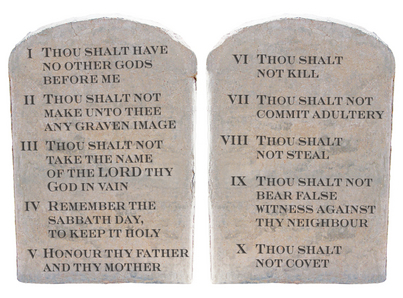 I’d have to say… no.
I’d have to say… no.
I mean, I had to look them up to be sure I knew them all correctly (I didn’t), and I still consider myself a fairly ethical person. Heck, even some of our most outspoken bible-thumping political leaders, like Georgia Republican Representative Lynn Westmoreland, who famously co-sponsored a bill requiring the Ten Commandments be displayed in both the House and the Senate, when asked, could not recite them all.
Then there’s controversial Judge Roy Moore, who campaigned fervently to keep the Ten Commandments displayed in front of a Kentucky courthouse, and defied the Supreme Court’s orders to remove them. He argued that, “Without God, there can be no ethics.”
I’d like to know: Do you agree? Does morality begin (and/or end) with religion? Specifically, the religious instructions to be found in the Decalogue?
For me personally, it doesn’t. While I don’t disparage the role of religion in people’s personal morality, I don’t think it has to form the be-all and end-all of it. I think, as we were discussing the other day, ethics has to do with any code you live by. That code can be based on whatever your concept of right living is. Now, the Ten Commandments have some great, er, suggestions (commands?) but I don’t know that they’re the only ways to approach leading a moral life. After all, some of them sound kind of… odd… to modern ears, like the injunction against coveting one’s neighbor’s oxen, (though I understand that’s metaphorical).
I recommend a look at Beliefnet’s fine chart comparing the Protestant, Catholic, and Jewish versions of the Ten Commandments, which is too long to reproduce here.
Meanwhile, please, sound off… What role do the Ten Commandments play in your everyday ethics?
Subscribe to receive updates from Everyday Ethics or follow us on Twitter!
